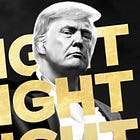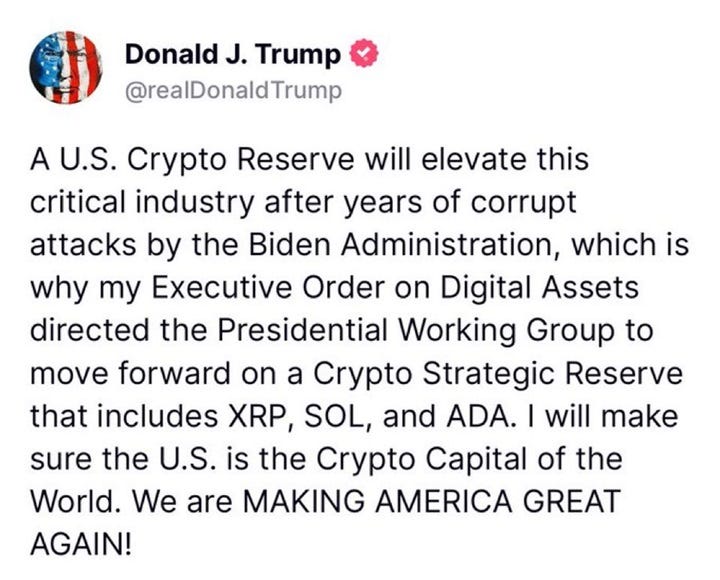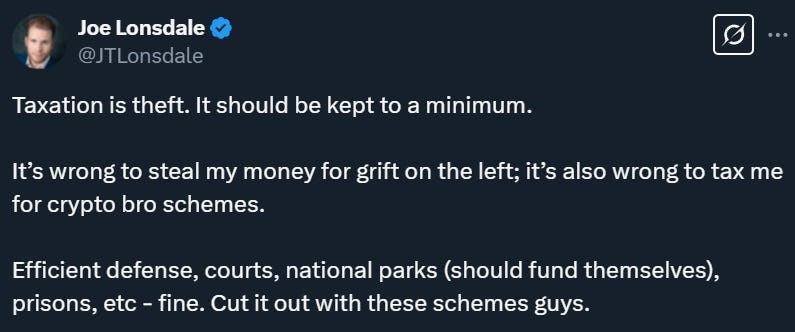A sovereign crypto fund is a new way to pay out regime cronies
Once again, we find that crypto's true innovation is enabling gray-market payments.
My favorite political science theory is called selectorate theory. In a nutshell, it goes like this. In any political system, you have some group of people called the “selectorate” who are responsible for choosing the leader. In a democracy, these are the voters; in a military dictatorship, they’re the generals and colonels who control the military; in a communist country they’re the Communist Party, and so on.
In the theory, in order to gain and hold power, a leader has to get a critical mass of this selectorate on his side — a “winning coalition”. In order to win over this winning coalition, he has to promise them government benefits — basically, payouts of some sort. The basic idea of selectorate theory is that autocracies are weak because they require the leader to give huge payouts to way too many cronies, which ends up hurting state finances and entrenching an unproductive and corrupt system — think of how Iran’s Revolutionary Guard owns a bunch of the country’s businesses and operates them unproductively.1
Selectorate theory is certainly a very oversimplified explanation of politics — it ignores important things like ideology, norms, external threats, and so on. But it does really get you thinking about regime payouts — how a leader can effectively deliver state funds to his favored cronies. In fact, even if said cronies aren’t actually the ones that put the leader in power, and he’s just paying them out because he likes them, it’s still interesting to think about.
Watching the Trump administration at work, it has occurred to me that cryptocurrency is an important innovation in the payments field — but perhaps not in the ways its creators hoped. In a post back in January, I explained how memecoins — cryptocurrencies that no one thinks will ever become viable currencies, but which are linked to a specific creator whom everyone knows owns the biggest share of the coin — can basically be used as slush funds that rich people can pay into in order to buy influence:
Today I want to think about money flowing in the opposite direction — government leaders handing public funds to their private cronies.
The reason I’m thinking about this right now is that Trump has just announced his intention to have the government create a strategic crypto reserve. He eventually stated that the reserve would include Bitcoin and Ether, the most widely owned cryptocurrencies (disclosure: I own both Bitcoin and Ether). But initially, the only cryptocurrencies he mentioned that would be included in the strategic reserve were the less widely used Ripple (XRP), Solana (SOL), and Cardano (ADA):
What this means is that Trump wants to have the U.S. federal government buy large amounts of a few specific cryptocurrencies. This will require either raising taxes on the American people, or making the U.S. government go deeper into debt at a time when interest payments are already spiraling out of control. As Elon Musk says, that debt must eventually be paid with either future taxes or future inflation (or wiped out in a sovereign default that causes a horrific economic collapse).
So Trump wants to take your hard-earned money and give it to whoever owns Ripple, Solana, and Cardano. Understandably, some people are upset at this — including some people in Trump’s own political camp:
These folks probably don’t own a lot of Ripple, Solana, or Cardano — not many people do, after all. And so if Trump’s crypto fund goes through, these folks will be on the hook for higher taxes (or higher inflation) to pay out whoever does own a lot of Ripple, Solana, and Cardano. Trump softened the blow a bit by belatedly adding that he would have the fund buy Bitcoin and Ether, which a lot more people own. But it seems clear that if Trump’s idea goes through, a relatively small number of people are going to get enormous taxpayer-funded payouts.
Who stands to gain? Well, that’s the first reason crypto is such an ingenious tool for regimes to send money to favored individuals. Crypto holdings are anonymous — the public doesn’t even know who has a bunch of XRP, SOL, and ADA. But if you have a bunch of one or more of these coins, you can go whisper in Trump’s ear: “Hey man, I own a ton of Cardano.” And if you’re someone Trump wants to pay out, he can then just include Cardano in his list of cryptocurrencies that he wants the U.S. government to buy. Everyone knows that someone got a big payday, but no one knows who, except for the parties involved. Regime crypto payouts are inherently secret, even when done in plain sight.
Keep reading with a 7-day free trial
Subscribe to Noahpinion to keep reading this post and get 7 days of free access to the full post archives.









